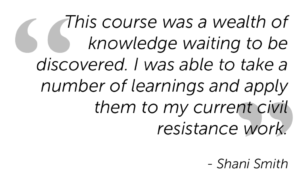ICNC's 2022 Participant-Led Online Course on Civil Resistance
Application are closed.
ICNC is launching the sixth edition of a highly popular, information-packed and free participant-led online course on Civil Resistance Struggles: How Ordinary People Win Rights, Freedom, and Justice.
This course is unique because it is entirely driven by a carefully selected group of applicants from around the world that have experience with or interest civil resistance. ICNC has developed a robust and cutting-edge curriculum to create the space for participants to engage in lively interactions with their fellow learners.
The online course begins on Wednesday, April 20, 2022, and ends on Thursday, June 6, 2022. ICNC is looking for highly motivated participants with educational and/or practical experience in the field of civil resistance, nonviolent movements, and organizing who can bring energy, lived experience, and intellectual investment to this participant-driven course.
Image credit: Flickr user M.o.B 68, via Creative Commons, Black Lives Matter M.o.B 68
Basic Info:
In this course, 50 highly motivated and collaborative participants from around the world will:
- Study scheduled modules of selected readings, videos, and pre-recorded experts and practitioners’ input on key aspects of civil resistance campaigns and movements;
- Participate in online discussion forums by sharing thoughts and ideas about course content that will help deepen individual learning;
- Share experiences and stories related to course themes to build a collaborative learning community with other learners.
What Do We Mean By A Participant-Led Course?
This participant-led course is designed by ICNC as a cohort-based course where the accepted participants work together as a collaborative learning community with some technical assistance from ICNC, but without instructors’ moderation or comments on participant discussions. The ultimate responsibility for the success of the course depends on each participant staying active, working together effectively, and helping each other build a strong and motivated learning community.
A participant-led course requires:
- a great deal of responsiveness toward your fellow learners reflected in your engagement not only with the course material but even more so with other participants’ contributions and posts in various course forums;
- a strong sense of shared leadership among its participants; as well as
- a high degree of self-motivation, an open attitude to learning, a desire to share and interact with others, and some relevant background knowledge or experience.
Course Details and Who Should Apply
This two-month online course, starting in April 2022, provides an interactive, in-depth, and evidenced-based perspective on civil resistance movements and campaigns. Here are the details:
Course Dates
Dates: Tuesday, April 20 – Monday, June 6
Orientation date and time: 10am and 2pm EDT, Wednesday, April 20
Application Deadline: Sunday, April 10, 2022, by midnight EDT
Applicants will be notified of their acceptance status by Wednesday, April 13, 2022.
Online Platform
The course will take place on ICNC’s online learning platform, and begins with a live orientation webinar that guides admitted participants through signing up, logging in, interacting in the online space, and getting the most out of their online learning. Participation in the class is not restricted by time zone. Course content, forums, and posts are all accessible to participants at any time of day.
Types of Activities
The course will involve an international learning community engaged in a number of activities to be completed within specific time frames. These include readings, viewing videos, online research, and active engagement with weekly discussion forums.
Course Goals
The goals of this course are:
- To introduce cutting edge thinking and research findings on various topics in civil resistance, as outlined in the course content below.
- To discuss case studies of nonviolent campaigns and movements.
- To reflect on the effectiveness of civil resistance and its power to overcome challenging conditions.
- To provide a platform for peer-to-peer learning and networking.
- To offer an interactive and structured learning environment for participants to become a more informed observer of nonviolent conflicts and effective conveyor of civil resistance knowledge.
Course Schedule
Module 1: Orientation and Getting Started. April 20 – 21
Opening the Course Site • Live Orientation Webinar • Introduction to the Course, Participant Introductions, and Learning Gains Survey
Module 2: Foundations of Civil Resistance. April 22 – 28
What Is Civil Resistance? • People and Power • Historical Record and the Long-Term Effectiveness of Civil Resistance
Module 3: Historical Cases of Civil Resistance from Around the World, April 29 – May 5
National Liberation Cases • Safety and Autonomy Cases • Defense and Expansion of Rights Cases • Public Accountability Cases
Module 4: Strategy and Tactics of Nonviolent Struggle. May 6 – 12
Analyzing Nashville Lunch Counter Campaign • The Strategic Role of Women in Civil Resistance • Strategy and Tactics of Nonviolent Struggle • Conflict Analysis Tools • Cultural Resistance
Module 5: Repression, Backfire, and Defections. May 13 – 19
Repression and Backfire • Encouraging Defections
Module 6: Violent Flanks, Agent Provocateurs, and Maintaining Nonviolent Discipline. May 20 – 26
Violent Flanks • Agent Provocateurs • Maintaining Nonviolent Discipline
Module 7: New Frontiers in Civil Resistance Studies. May 27 – June 2
Democratization and Civil Resistance • Civil Resistance Against Abusive Corporate Practices • Civil Resistance and Faith Communities • Civil Resistance, Peacebuilding, and War
Module 8: Closing the Course. June 3 – June 6
Course Evaluation • Learning Gains Survey
Who Should Apply
 We encourage any movement activists, organizers, scholars, educators, members of civil society, policy professionals, and journalists to apply to take this course—if you think the course will help you participate in, support, or analyze nonviolent peoples’ movements for human rights, political freedom, social justice, and environmental sustainability more effectively. For this class, we are looking for participants from all over the world who:
We encourage any movement activists, organizers, scholars, educators, members of civil society, policy professionals, and journalists to apply to take this course—if you think the course will help you participate in, support, or analyze nonviolent peoples’ movements for human rights, political freedom, social justice, and environmental sustainability more effectively. For this class, we are looking for participants from all over the world who:
- Have strong personal motivations to learn and apply their knowledge of what makes civil resistance struggles effective;
- Are willing to engage with other participants and share their knowledge and experience about nonviolent movements and campaigns in respectful and collaborative ways, even when they disagree;
- Are comfortable/proficient in writing, reading, and speaking in English; and
- Are committed to meeting the work expectations and the participant code of conduct as outlined below.
Expectations of Participants
Work and Time Commitment
 All participants are expected to spend a minimum of 7 to 10 hours per week in the online classroom and should average at least 1 hour per day for the full duration of the course. The course work involves reviewing materials, posting comments about the readings and assigned videos, and interacting with/responding to other participants’ posts. Meeting these requirements is essential to the learning experience for the participants and for the group. Course content released each week builds on past content; therefore learning is interrupted and ineffective when participation is irregular. In addition, we believe that all of our participants have important contributions to make to the learning experience. Lack of participation and irregular or no posting are therefore a disservice to other participants.
All participants are expected to spend a minimum of 7 to 10 hours per week in the online classroom and should average at least 1 hour per day for the full duration of the course. The course work involves reviewing materials, posting comments about the readings and assigned videos, and interacting with/responding to other participants’ posts. Meeting these requirements is essential to the learning experience for the participants and for the group. Course content released each week builds on past content; therefore learning is interrupted and ineffective when participation is irregular. In addition, we believe that all of our participants have important contributions to make to the learning experience. Lack of participation and irregular or no posting are therefore a disservice to other participants.
Participant Code of Conduct
Because no outside moderation of online discussions is planned for this course, a specific code of conduct has been developed to ensure that participant interactions and knowledge sharing are as meaningful, substantive, and respectful as possible. If you apply, this means you agree to:
- Respect each others’ points of view;
- Share comments that relate to forum questions;
- Focus on the phenomenon of civil resistance. If you find your conversations with others going onto other topics that are not directly related to the course, then you should take those conversations outside of the course (e.g., over email, Facebook, phone) or in the special “Community Conversations” forum;
- Review assigned material (readings/videos) included in the course chapters before responding to questions raised in the forums;
- Keep an open mind and maintain a desire to learn from others. People in the community may have strong perspectives, but do not dismiss others simply because they have a different perspective;
- Focus on debating ideas, and separate people from ideas in the process. If you disagree with an idea, don’t attack the person who posted the idea personally or make assumptions about their motives;
- Back up your ideas, criticism and arguments with references to authoritative and verified sources or experience;
- In addition to the readings in the online course, refer to other source materials to support your statements or as a background information to the point you are making;
- Read carefully and in their entirety posts made by other people before replying to them;
- If something is not clear in someone else’s comment, do not hesitate to ask for clarifications and further explanations;
- Present various possible arguments that might be made around the discussed issue;
- Write as concisely as possible while still being clear;
- Post regularly to the required forums and catch up as soon as possible with your comments on the scheduled forums that you have not yet posted;
- Formulate your thoughts and ideas in clear language. Assume that other participants will not have any knowledge about the case that you are elaborating on;
- Share first-hand accounts and stories from your personal and professional work, study, or activity that pertain to the discussed subject matter;
- Humor, encouragement, praise, constructive criticism, and putting yourself in someone else’s shoes are the most effective way to engage with others and facilitate informed discussions that do not exclude anyone;
- No profanity or personal insults;
- Do not hesitate to report any inappropriate, offensive or vulgar posts to the course administrators;
- Unless there is a personal or family emergency, you should not abandon your learning community of fellow participants and go silent for the whole week (an average duration of the module);
- Do not be tardy with posting during the week as this negatively affects your and other participants’ learning progress;
- Do not copy and paste from outside sources when you write in forums. Use your own wording and vocabulary, though feel free to cite authoritative and verifiable sources.
Even though we have never had any problems of the following kind during our previous online course interactions, we want to make sure that participants:
- Do not use ad hominem attacks or any adverse remarks against a participant’s race, gender, religion, national origin, age, disability, or sexual orientation;
- Do not use threats or incite any kind of violence.
Participants will be responsible for following and enforcing the code of conduct of their learning community throughout the duration of the course and anyone who does not follow these guidelines can be removed from the course by ICNC staff at any time. (Learners’ concerns about a participant’s behavior that cannot be resolved through clear communication, active listening, and making requests of other participants can be sent directly to ICNC’s Academic Initiatives staff.)
Certificate of Completion
A certificate of completion will be awarded, upon request, to participants who fulfill all requirements for satisfactory completion of the course. This requires:
- Reviewing all required materials in each course module;
- Completing all quizzes and surveys set up in the modules;
- Posting relevant comments about the readings and assigned videos in all required forums in each course module;
- Interacting with/responding to other participants’ posts in all required forums in each course module;
- Engaging in and moving forward the small group projects in the course;
- Spending at minimum between 7 and 10 hours per week in the online classroom, averaging about 1 hour per day for the duration of the course on reviewing materials, posting comments and interacting with/responding to other participants’ posts.
If requested by a participant and awarded by ICNC, a certificate of completion will be sent by email in PDF format within three weeks after the end of the course.
Selected Testimonials from Past Participants
“Excellent, motivating and inspiring course on civil resistance. The course offers the opportunity to engage with experts on the field and exchange experiences with course participants from all over the world, all of them with broad knowledge on that issue.” – Núria Suero Comellas, ICNC Participant-Led Course 2020
“This course was very comprehensive and greatly strengthened my knowledge and skills in the civil resistance.” – María Fernanda Noboa, ICNC Participant-Led Course 2020
“The experiences regarding civil resistance movements in different countries were instrumental to contextualize it to my context. Ideas coming out from group members shaped my thoughts and encouraged me to do more.” – Anonymous, ICNC Participant-Led Course 2019
“I appreciated participants talking about the movements they had been involved in or the contexts where they were coming from. Speaking with international participants was fantastic.” – Anonymous, ICNC Participant-Led Course 2019
“This ICNC participant-led online course isn’t just a wonderful platform for self-learning and experience sharing on the crucial issue of civil resistance. It is a world community of engaged and conscious citizens who discuss, dream, and act for a better tomorrow that is within our reach.” – Myriam Marcuello, ICNC Participant-Led Course 2018
“Taking this course expanded my knowledge and awareness of all aspects of civil disobedience from misperceptions, its effectiveness, history, tactics and challenges. Collectively participants shared a wealth of experience. This course is highly recommended whether one is new or a veteran to nonviolent action.” – Anonymous, ICNC Participant-Led Course 2017
“This is a wonderful course for learning the rudiments of nonviolent civil resistance. It is stocked with many sources and resources to teach participants a strong historical and contemporary understanding of civil resistance. It is also great to connect with many people who share interests in the topic and provides opportunities to learn from them.” – Austin Silvan, ICNC Participant-Led Course 2017
Frequently Asked Questions
1. “Given that there are no faculty moderators for this course, what can we expect from ICNC?”
ICNC has designed a well-structured, participant-tested, curriculum plan for this course that can be self-managed by active and engaged participants. We have organized the topic content, set up the discussion forums, and provided instructions and tools to move through each of these learning tasks successfully. Participants can write ICNC’s designated course administrator with any technical questions about using the course material and forums. We will help participants troubleshoot any technical problems. In extreme situations, where a participant repeatedly violates the course code of conduct and refuses to respond to feedback and requests from other participants, our course administrator will respond to concerns and try to improve the situation or drop a disruptive participant from the course.
2. “Should I still apply if I won’t be able to meet all of the participation expectations of the course?”
Preference in admission will be given to those who can commit fully to the stated course requirements, including an average commitment of 1 hour per day. We cannot guarantee an admission for those who cannot commit to the course requirements though they can still submit their online application for our consideration and add a note regarding how much they can commit to if, for various reasons, they cannot take the full course load.
3. “What is the anticipated knowledge level of participants? How much are they supposed to know about civil resistance or have experience with it?”
Since it is participant-led course, it is beneficial if most applicants have some level of practical experience or some basic knowledge of nonviolent resistance or both. This will contribute to deeper and more meaningful exchanges and engagements with other students. Having said that, applicants with no prior experience or knowledge of the subject will not be automatically rejected if they demonstrate that the course will be important for them in planning for & launching civil resistance actions in the short to mid-term time frame.
4. “What advice do students from previous participant-led courses have for those applying for this course?”
Here is what previous students for this course advise:
- Go through the course material early in each module;
- First do the compulsory tasks and then go back and read or look at the optional materials further if you want to, but only after the compulsory work has been done;
- Make a study schedule;
- Write about and post your initial responses to the course material before you start reading the comments of others;
- Scan other participants’ comments, and respond to at least one or two in every forum you are engaged in–and more if you feel grabbed by what people are talking about. If you have expertise and can offer support, wisdom or thoughtful questions, do so;
- Quote key parts of the posts you are responding too in a different font from the text of your response;
- Get into a habit of spending an hour or two a day working on this course. Frequent visits to the website and nearly daily work helps with digesting and synthesizing all this new information;
- It often helps to go back to review the course material toward the end of a module after your initial overview and forum discussions get started;
- Work hard to keep up with your work—for your sake and the sake of other participants;
- It is helpful to sign up for daily email digests for discussion topics, especially at the beginning of the course. However, as the course progresses and the responses are spread among many forums, there will be a time when you need to read the forums in context so you know what they are about;
- Ask for help from other participants or the course administrator when necessary;
- Validate other participants and encourage the full participation of others. Reach out to participants you haven’t heard from recently and tell them how much you appreciate their participation;
- Stay curious and try to learn as much as possible.
For information or questions, email icnconlinecourses [at] nonviolent-conflict [dot] org
To Apply
Applications are now closed.
